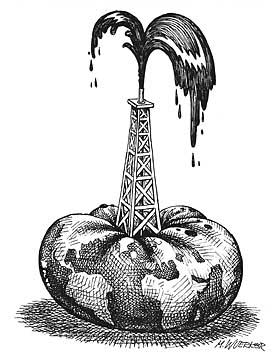"I think it's very simple," he said. "Just as the forest cannot use more energy than is available by photosynthesis, human civilization cannot use more energy than what's available from the sun or from our temporary joy ride on fossil fuels."- Hall Hall, a 68-year-old New England born professor with a gift for plain speaking, has made a name for himself by championing a revolutionary idea known as energy return on energy invested (EROI). Every plant, animal and human civilization lives by EROI.
The law isn't rocket science. Whenever a salmon, bear, lodgepole or Dow Jones company spends more energy on an activity than they get back, death follows. Or in corporate terms, debt builds and things fall apart. 
...fish studies convinced Hall that the world revolves around surplus energy: "Everything in life is about energy costs and energy gains." (In Hall's line of thinking, the best advice a parent can ever give a child is strictly fishy: invest your energy wisely.)
Puzzling picture of oil drilling
After his fish energy studies Hall, a student of the great ecologist Howard Odum, started thinking about energy gains in the oil patch in the early 1980s. He wondered if the industry experienced that same sort of declining returns over time that dogged the world's fisheries. As ships, nets and quantity of oil burned got larger, the protein returns per unit of energy invested shrank dramatically.
Cutler Cleveland, then a muscular undergraduate and now an energy brain in his own right, investigated and came up with a puzzling graph.
 It was N shaped and showed energy gains for oil going up and down like a yo-yo. "The yield per foot of drilling would reach a minimum and then jump back up, then down even more sharply." Hall then asked Cleveland to add the number of feet drilled per year and then the graph showed a dramatic decline over time. "It was just like the fisheries."
It was N shaped and showed energy gains for oil going up and down like a yo-yo. "The yield per foot of drilling would reach a minimum and then jump back up, then down even more sharply." Hall then asked Cleveland to add the number of feet drilled per year and then the graph showed a dramatic decline over time. "It was just like the fisheries."
The Wall Street Journal reported on the findings with a headline that declared "Increased Drilling for Oil May Consume More Energy Than It Gleans." Like most of the media it then forgot all about EROI.
"Politicians who say, 'Drill, baby, drill' have their head up their asses," adds Hall. "You don't get more oil by drilling more. You just get less efficient returns. You only get more oil by drilling thoughtfully."
But Hall's EROI work (and that of students and colleagues) unsettled the energy status quo. "We never got any money to do this," he reflects. "It all happened on weekends or pro bono.
No government agency is interested in the information...Most science, to be honest, promises some form of candy.
EROI doesn't do that and we don't do that."
Steep decline in energy returns
In a new analysis for Sustainability Journal (along with 19 other papers on EROI) Hall spells out how steep the decline in energy returns has become in the oil industry. The trend almost looks as dismal as catches for the wild salmon fishery.
In 1919 petrolistas got marvelous EROI returns for finding oil at 300 to one.
Today that EROI has dropped as low as five or three to one.
The energy returns for producing oil are plummeting too. Please read full here